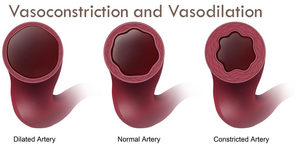Vasodilation
Vasodilation can be described as a widening of the veins and blood vessels which results from the relaxation of smooth muscle cells within the vessel walls. It is particularly prevalent in the large arteries and small arterioles. The primary function of vasodilation is to increase blood flow in the body to tissues that need it most. In essence, this process is the opposite of vasoconstriction, which is the narrowing of blood vessels.
This effect is typically very difficult to consciously perceive but often results in a bloodshot red eye effect and relief from glaucoma.
Vasodilation is often accompanied by other coinciding effects such as decreased blood pressure. It is most commonly induced under the influence of moderate dosages of cannabinoid compounds, such as cannabis, JWH-018, and THJ-018. However, it can also occur under the influence of poppers and viagra.
Psychoactive substances
Compounds within our psychoactive substance index which may cause this effect include:
- 5F-AKB48
- 5F-PB-22
- APICA
- Cannabis
- GBL
- GHB
- Harmala alkaloid
- JWH-018
- JWH-073
- Myristicin
- Poppers
- STS-135
- THJ-018
- THJ-2201
Experience reports
Anecdotal reports which describe this effect within our experience index include:
See also
- Responsible use
- Subjective effects index
- Psychedelics - Subjective effects
- Dissociatives - Subjective effects
- Deliriants - Subjective effects
